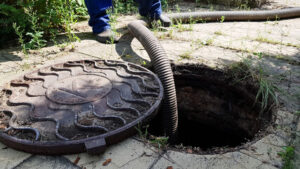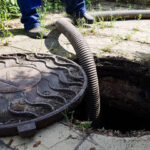Home » Posts tagged 'septic pumping'
Tag Archives: septic pumping
The Importance of Septic Pumping
The septic tank pump is a vital component of your onsite wastewater treatment system. The pump takes organic wastewater and solid waste from the septic tank and moves it into your drainfield for treatment.
Regular septic tank pumping prevents waste and wastewater from overflowing. It also promotes efficient wastewater treatment and increases property value. Visit Website to learn more.
A septic tank that is too full can no longer separate solid waste from wastewater and sewage, which can lead to a drain field blockage or sewage backup into the home. Regular septic tank pumping helps prevent this and keeps the system working properly.
The frequency of septic tank pumping depends on many factors, including household size and water usage. Larger households use more water and produce more solid waste, which increases the need for a more frequent septic tank pumping schedule. Garbage disposal use also adds to the amount of solid waste in the septic tank, increasing the need for more frequent service.
Other ways to help reduce the need for septic tank pumping include using faucet aerators and shower heads that restrict water flow, spreading laundry loads out over several days, and fixing leaky sink and shower fixtures. Using septic-safe cleaning products and avoiding the disposal of chemicals, cigarette butts, diapers, wipes, feminine products, and grease can further lighten the load on your septic system.
If you’re unsure how often to have your septic tank pumped, a professional can assess your situation and recommend a schedule. You should also watch for warning signs that your septic system needs servicing, such as slow-draining sinks, toilets, and bathtubs, sewage in the yard, or foul odors coming from the drain field.
While some homeowners attempt DIY septic tank pumping, this can be dangerous and ineffective. Professionals have the necessary equipment and knowledge to safely and effectively perform septic tank pumping, identify potential problems, and provide advice for system maintenance.
Keeping your septic tank in good condition is important to protect your family’s health and safety, and improve the property value of your home. Proper care and routine pumping ensures that the septic system will serve your family for years to come. A well-functioning septic system is a big selling point for buyers and can raise the value of your home. A failing septic system, on the other hand, can detract from the property value and cost you money in repairs and a reduced sale price.
Prevents Environmental Contamination
A septic system treats household wastewater, filtering it into the soil to help replenish groundwater supplies. But if the system fails, the solid waste can leak into nearby waterbodies like streams and lakes, contaminating drinking water. Regular pumping and cleaning prevents these contaminants from entering the water supply, keeping the surrounding environment healthier and reducing the risk of costly system failure.
Generally, the frequency of septic tank pumping depends on the size of the tank and the number of people living in the home. Larger tanks need to be pumped less frequently than smaller ones. The most common signs that a septic tank is overdue for a pumping are slow drains and foul odors around the home. If you notice pools of water in your yard or smell sewer backups, schedule a pumping appointment as soon as possible to avoid a costly septic tank failure.
Before pumping, a professional will inspect the septic tank to assess its condition and locate its access points. They’ll then open the lid or cover and insert a hose into the access point to begin pumping out waste. Once the tank is emptied, the technician will clean and inspect the tank components to prevent future issues.
Having the right system in place can greatly reduce your septic tank pumping needs. But it’s important to practice water conservation and not flush or pour anything down the drain that could clog your septic system. Non-biodegradable materials like baby wipes, cotton swabs, and feminine hygiene products can clog pipes and ruin the septic tank’s efficiency.
Regular septic tank pumping ensures that the system can process waste properly, preventing clogs and other problems. It also helps to keep sewage odors at bay, making your home more pleasant and healthy for you and your family.
While septic tank pumping isn’t an aesthetically pleasing task, it is one of the most effective ways to maintain a septic system. Regular septic tank pumping prevents a range of costly problems, and it can also significantly increase your property’s value. Be sure to follow septic tank pumping recommendations from a trusted, local septic service to get the most out of your investment.
Reduces Water Waste
A properly functioning septic tank treats wastewater and eliminates harmful bacteria that could otherwise infiltrate groundwater. However, solid waste accumulated in the septic tank over time slows this process down. This can cause foul odors throughout the home and yard, which signals that it’s time to pump. Regular cleaning and pumping prevents these odors and ensures that the septic tank is working effectively.
Before a septic pumping technician begins the process, they’ll inspect your septic system and locate the tank’s access points. Then, they’ll use a large vacuum truck equipped with a hose to drain the sludge and scum layers from the tank. Once the solid waste is removed, the liquid sewage can filter out of the tank and into the leach field. It can then be treated by the soil or recycled for environmental purposes.
During this process, a septic system specialist may also clean and inspect the septic tank itself. They may use a long-handled tool to scrape up the sludge off the bottom of the tank, which allows for more efficient pumping. They’ll also look for signs of cracks or damage and provide maintenance advice.
Water conservation practices are the best way to prevent septic tank strain and keep your system running smoothly over the long term. Avoiding activities like prolonged showers and excessive laundry will help reduce the amount of wastewater that’s sent into your septic tank and drain field. You can also use low cost, low-flow appliances such as washing machines, faucets, and showerheads.
In addition, repairing leaky faucets and toilets promptly will help conserve water and minimize strain on your septic tank. You can also practice simple water conservation techniques like using rainwater for gardening or flushing only full toilets. These habits can extend the life of your septic system and save you money on your utility bills.
Increases Property Value
When a home is on a septic system instead of a public sewer system, routine pumping can save the owner money and add value to their property. But just like any other part of a home, it must be properly maintained to function properly and prevent costly repairs down the road.
Most septic systems need to be pumped every two to five years, depending on household size and how much wastewater is produced. Regular pumping reduces the wear and tear on the system, prolonging its lifespan and preventing inconvenient emergency repairs. It also keeps wastewater out of local water supplies, which can create costly cleanup fees for untreated sewage.
When it comes time to sell your home, keeping up with septic tank maintenance is one of the best ways to maximize its potential and increase its value. A well-functioning septic system demonstrates that the homeowner cares about their property and takes the steps necessary to protect it. This is a huge selling point in today’s real estate market, where Buyers are looking for homes that are meticulously cared for.
Septic tanks that aren’t pumped regularly can lead to clogs and wastewater overflows, which is inconvenient and messy for homeowners. In some cases, this can cause a septic system to fail altogether, which can cost thousands of dollars to repair or replace. Regular septic tank pumping and inspections can reduce these costs, saving homeowners thousands down the road.
In addition, failing to maintain a septic system can result in odors and environmental contamination. This can cause the septic system to require expensive upgrades or expansions to address these problems, which can significantly impact a home’s resale value. On the other hand, upgrading an aging septic system can improve its efficiency and ensure that the homeowner is in compliance with local regulations.
In addition, having a certified septic inspection and maintenance records can give a potential Buyer confidence that the septic system is in good working order. This will help to alleviate fears of a costly septic system failure, which could delay the closing process and negatively affect the sale price.




